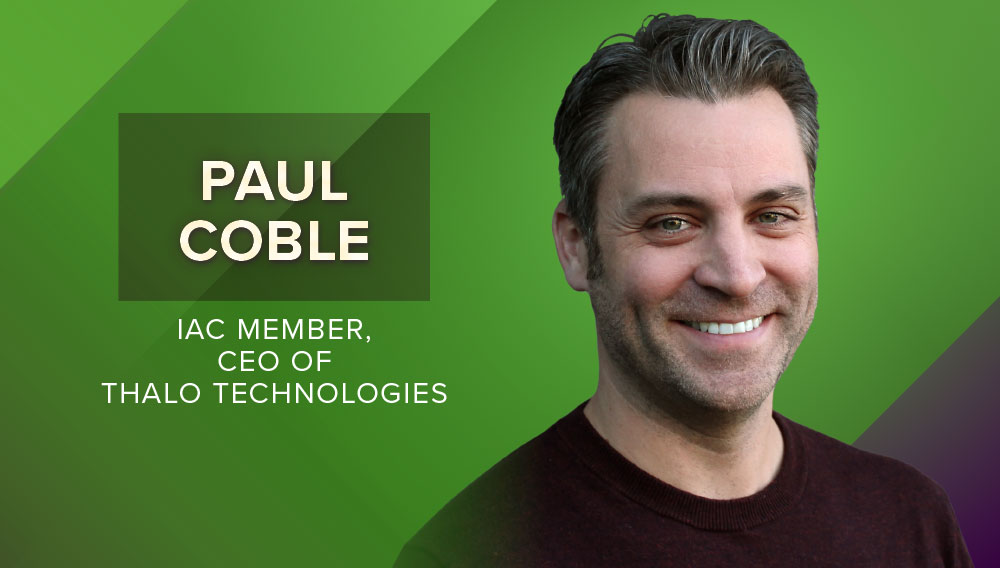Q & A with Paul Coble: Attorney and Founder of Thalo Technologies and Advisor for the Cannabis Control Certificate Program

Our next blog post about members of the Graduate Certificate in Cannabis Control’s Industrial Advisory Committee spotlights Paul Coble, attorney and founder/CEO of Thalo Technologies. Thalo is not only a member of the program’s IAC, but also the subject matter expert for the program’s Risk Assessment in Cannabis Control course. Read on to learn more about him!
Background
Coble is an intellectual property attorney and cannabis software executive with an extensive background in science and technology. He studied molecular biology and chemistry in his undergraduate program before turning to study law.
Coble attended Arizona State University’s Sandra Day O’Connor College of Law and graduated cum laude with a concentration in law, science, and technology. He studied how science and law interact and affect each other’s trajectories. As a practicing attorney, Coble has helped clients navigate and mitigate risk relating to intellectual property and heavily regulated markets such as alcohol, personal data, pharmaceuticals, and, of course, cannabis. He is a registered patent attorney and has litigated complex intellectual property cases across the country.
After a decade of practicing law, Coble decided to enter the cannabis industry and launched a startup, Thalo Technologies, to develop software to help cannabis and hemp manufacturers better capture and interpret their lab data to make more profitable decisions. He is currently serving as vice-chair of the National Cannabis Industry Association’s Cannabis Manufacturing Committee and is sitting by designation on the NCIA’s Policy Council. He also volunteers as general counsel of the Social Justice & Engineering Initiative.
Q & A with Paul Coble
Q: How did you get started in the industry?
A: I always wanted to start a company and my unique background in chemistry and data products led to a unique opportunity in cannabis manufacturing.
Q: Do you hold any certifications? If so, which one(s)?
A: Member of the IL bar and U.S. Patent bar.
Q: What do you hope students will take away from the Graduate Certificate in Cannabis Control program?
A: Students will gain a better perspective of how cannabis policy affects the major stakeholders in the industry (regulators, operators, consumers) and how policy affects risk throughout the supply chain.
Q: What is a piece of advice you’d offer someone getting into the industry?
A: The industry is growing so quickly, [that] there is something that everyone can offer to improve the industry.
Q: What is one thing you wish you had known before entering the industry?
A: For an industry that changes as quickly as it does, there are also times where it moves very slowly and with great difficulty.
Q: You mentioned students will benefit from the course CBC 602 Risk Assessment in Cannabis Control by gaining a better understanding of cannabis policy effects. In addition to this, how do you think the cannabis control certificate program, as a whole, will benefit students?
A: A major shortcoming in the cannabis industry today is a lack of understanding. Too often, regulators do not understand the needs of consumers or operators. Operators are frustrated with the lack of transparency and practicality in regulations, and consumers don’t understand why they have to jump through bureaucratic hoops and pay exorbitant prices. Some of this lack of understanding comes simply from the fact that this is a relatively new industry and the conventional knowledge base is still playing catch up.
The Graduate Certificate in Cannabis Control program is designed to introduce students to all the issues that shape the cannabis and hemp industries, not just the issues important to any one particular demographic. The issues present in the cannabis industry range from the expected business considerations to niche considerations driven by the unique scientific and legal nature of cannabis. Students will be able to move into the cannabis industry with a complete understanding of the various components of the industry and a comprehensive understanding of how they relate to each other. Furthermore, they will create as part of the program a bespoke toolbox of resources to help them navigate and thrive in the evolving industry.
Q: What are some organizations or associations that you recommend industry newcomers join? How could they benefit from joining them?
A: There are two organizations that anyone in the cannabis industry should become involved with: (1) the National Cannabis Industry Association (NCIA), and (2) their state industry association (often MITA or HITA). Both organizations are helpful for meeting others who are interested in similar aspects of the industry. Like all industries, cannabis has niches and specialties and the more people that you know working on similar issues, the easier it will be to stay current. Trade industry associations are also critical in effectively lobbying lawmakers to make better cannabis policy.
Q: Which cannabis industry career path do you think is best for students who complete this program? Why?
A: One of the great parts of the cannabis industry is that there are very few standard career paths. People are moving into the industry from all types of backgrounds and there are career paths for just about anyone. That said, the two careers that stick out to me as benefiting the most from the certificate in cannabis control program are those related to creating cannabis policy or regulations and those that are related to operating a cannabis business. Future regulators will gain a better understanding of the science, history, business, and risks of the cannabis industry. Entrepreneurial students will gain a high-level view of the inner workings of the cannabis and hemp supply chains. Students will walk away with a wiki designed to include evergreen resources that will benefit any cannabis career path.
Q: As the subject matter expert for the Risk Assessment in Cannabis Control course, what information/content did you feel was most important to include in the curriculum? Why?
A: The risk assessment and control course starts with the premise that risk is relative to one’s perspective and, therefore, risk may be understood differently by different stakeholders in the cannabis industry: regulators, operators, and consumers. For example, government regulators are incentivized to reduce diversion for a variety of reasons, but unless they understand why the diversion is happening in the first place, they will never be able to create a policy to curb it effectively. Effective risk assessment and mitigation relies on understanding the motivations of the stakeholder groups and the industrial repercussions of policy decisions.
I feel that it is necessary at the outset to have the students place themselves in the shoes of each group to understand how each views the cannabis industry. Students will use the different values and drives of each group as they explore the different sources of risk in the cannabis supply chain.
=
*This interview has been edited for length and clarity.


